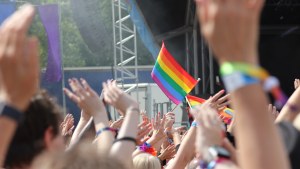Understanding Uganda's Anti-LGBTQ Law
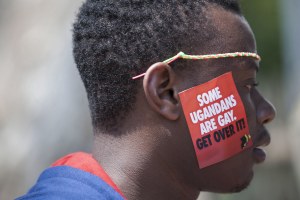 Play Podcast
Play Podcast
About the Episode
With Uganda's recent passage of an extreme anti-LGBTQ law, Deep Dish explores the external influences, particularly US evangelical groups, that have intensified discrimination in Uganda and beyond. Ugandan journalist Lydia Namubiru unravels the historical context and societal factors behind this pressing issue. And Minority Africa’s Caleb Okereke sheds light on the experiences and challenges faced by LGBTQ communities in Uganda and elsewhere on the continent.
- How US Evangelicals Helped Homophobia Flourish in Africa, Caleb Okereke, Foreign Policy, March 19, 2023
- Exclusive: US Christian Right pours more than $50m into Africa, Lydia Namubiru, Open Democracy, October 29, 2020
[Lizzy Shackelford: INTRO: This is Deep Dish on Global Affairs going beyond the headlines on critical global issues. I'm your host, Lizzy Shackelford with the Chicago Council on Global Affairs.
Today we're tackling a depressing and deeply troubling issue that has stirred global concern. Uganda, a country known for its vibrant culture and diverse population has recently passed a highly controversial and draconian anti-LGBTQ law.
(AUDIO SOUNDBITE)
To help us understand some feelings inside Uganda, within the LGBTQ community, we spoke with Caleb Okereke, the founder and managing editor of Minority Africa. He decided to focus on minority rights in Africa because as a journalist, he was very frustrated by how he felt the media was covering minority groups…]
Caleb Okereke: It wasn't just sexual and gender minorities, we traced like this prejudice coverage in media, right? It was kind of a far reaching effect that kind of spread to various minority groups. So I thought the coverage wasn't just merely coverage, but that was really contributing to how people perceive these groups, but also how people treated them. And I felt like there was an onus on Africans and for us to have a platform that would accurately, cover minority rights as led by minorities themselves. Right? Which is something that we've kind of tried to focus on and do to the best of our abilities since our inception. Beyond like anti-gay legislation, even the kind of like discourse around it does have far reaching effect, right? So even far before the law was passed, queer people like in the country got closed down. we saw, people like in, in March or April, the police arrested this group of boys who they said were acting gay porn and who are still actually in prison till now. and we've seen instances of people being like evicted from their homes or being asked to leave. And I think what's really like interesting is the fact that there's a kind of violence that like happens. within the panic. Right? So what's so worrying about laws like this is that even before the laws are passed, there's already kind of like a violent clan that it creates about queer people. Right? So I was recently, in Uganda and it was much more different from all the times I've been there previously. people were just more careful. People were just more concerned, you know, I always have like painted nails, I just couldn't do it this time cuz everybody was just like, that's just a bad idea, you know? and it's, just the way in which it rise, to social discuss, I think is, even much more worrying than the legislation. Right. The legislation becomes, I think the way in which that kind of like violence is legitimized, but there's still violence with or without it. The crazier thing now is that there's this kind of narrative that resistant Neocolonialism is going back to African roots, like entails resisting queerness, whereas that's completely untrue because queerness is entirely, you know, African right. It's not something that the west brought to Africa. And I think that's also what's very frustrating for me, like about what I feel is like the current anti-trans between the US because what it does is that it essentially emboldens, This rhetoric elsewhere in the fact that if people kind of like look up to the US and sort of see that, the Great America is debating, you know, the fundamental lives of trans people, it kind tacks with their own homophobia. So there's very strong parallels between, what I see happening in the US and what I see happening in places like Uganda and Ghana and across Africa now.
[Lizzy Shackelford: INTRO: But this anti-LGBTQ development is not solely a product of local politics. External forces, particularly American evangelical groups, have played a significant role in fanning the flames of discrimination and amplifying these efforts not only in Uganda, but elsewhere on the continent.
So let's delve more into the historical context of Uganda stance on LGBTQ rights and examine the societal factors and political landscape that have contributed to this with Ugandan journalist Lydia Namubiru. Lydia is the news editor at The Continent and the Africa Editor at Open Democracy. She's particularly interested in building African feminist movements and in the continents ebbing democracy.
Lydia says that Uganda's history with homosexuality as a political issue dates back to the country's colonial creation and the very founding of the nation…]
Lydia Namubiru: Uganda was built around a native nation called Buganda, and the last legitimate king of that nation that the colonialists overthrew was a gay man, a queer person. I think was a bisexual person and a big part of the propaganda. With which the colonialist de legitimized that king was around his homosexuality. And that led to a really brutal episode at the founding of Uganda, in which that king sentenced dozens of men to death for treason, essentially. But the colonialists and the missionaries that were allied with them talked a lot about that episode as him sentencing those men to death for refusing his homosexual advances. And so then I think Uganda's, the colonial creation is legitimacy is very much tied into. Anti-gay politics, anti homosexuality, sentiments, and so it has always had a really antagonistic relationship with, homosexuality for much of Uganda's history. Then, especially post-colonial history. There's been other things that may have been part of the undercurrent, other worries, other political projects and other political fights between people from many constituent Native Nations. That make up the country between politicians of different political parties and so on. Uganda has had a really turbulent history and it is in settling down nineties, where as it was settling down away from the bigger conflicts around, you know, between native nations, between political parties, between big. Tyrannical leaders, it's certainly down that then more social issues have come back in the forefront of national politics. And also happened, that around that time there was really strong LGBTQ rights activism in the west. Around the AIDS pandemic. And Uganda also had a really big AIDS epidemic. So some of that activism started, to bubble up in Uganda as well. And after a few years of that activism, the backlash, that counted, LGBTQ rights activism in the West also found its way into Uganda because there was, you know, a bubbling up of activism around LGBTQ rights, and inclusion in h i health healthcare that they interpreted as an adventure into Africa by Western LGBTQ rights activism and therefore followed, with Western LGBT rights activism. So, then the more recent history started around 2008 when US Evangelicals came to Uganda, held crusades and conferences to spread the propaganda and misinformation about there being a gay agenda that was out to antagonize, the traditional family, antagonize traditional values, and they won some Ugandan elite politicians and Ugandan pastors to their cause, who then, turned that project into homophobia in Uganda. So it would be around 2009, and drafted the first version of this law that came to be called the Kill the Gays bill.
Lizzy Shackelford: So I wanna get to that bill, but I wanna make sure that I've got this trajectory right. The, path as you've laid out, if I've got it correctly, is that Uganda's, anti homosexuality, tendency really came about during the colonial era. And due to, the influences of, British colonials and that prior to colonialism, was homosexuality pretty generally accepted, or at least not stigmatized?
Lydia Namubiru: Yeah, it's hard to say generally accepted considering that LGBTQ people are and or is were a minority. Therefore, it wouldn't be a big issue, you know, in public conversation. But I can't speak for all of Uganda because Uganda is a much bigger entity and it takes into lots of cultures that may have had varying views, but in the center of Uganda, in the kingdom that is the nucleus around which Uganda was built. Homosexuality was not at all frowned upon. It was a pretty common occurrence in the King's Court and to this day, lots of, people, lots of, people who identify as of that royal family. Really. also identify as bisexual or. Homo, not necessarily publicly, because again, Uganda is not very public about any kind of sexuality, including homosexuality, heterosexuality just a sort of, undiscussed. acceptance of lots of things. So I think it fell right there within those sorts of things. And because it was, well documented, especially in the royal courts, of the King of Uganda, I think it even enjoyed a certain amount of privilege that comes with, you know, whatever people who are particularly powerful at a particular time enjoy and, you know, lend legitimacy to whatever they accept.
Lizzy Shackelford: We'll fast forward up to the, kind of more modern day engagement of, what some have called a neo-colonial effort through, what your investigative reporting really helped to expose, which is the role of American evangelical groups in pushing for the current legal status, against homosexuality. So can you talk a little bit about, how this role developed? I guess going back to what you said around 2008?
Lydia Namubiru: Yes. So prior to 2008, there'd been some mostly quiet activism from LGBTQ people for inclusion in HIV/ AIDS care, because you're gonna have made lots of great progress around, HIV/ AIDS care, and openness and, defeating stigma. But it had been for heterosexual groups, but then suddenly homosexuality one of the biggest national conversations happening. It was one of the biggest things elite Ugandans seemed worried about, and it later turned out that it all started with conferences and crusades in 2008 by US Evangelical pastors who came to Uganda talking about quote unquote, the gay agenda. And how it was coming for traditional values and Christian values. And it had overridden the waste. It was coming to override Africa and Uganda in particular, so that's 2008. And at the same time they'd been. Already, sort of organizing groups, conservative US groups that had been involved with Uganda from the 1980s, groups like the Fellowship Foundation some of the members had been involved in Uganda supporting the president with connections to American politicians and American, financing as he tried to rebuild the country. And in return, they got access to Ugandan Elite. They supported Ugandan Elite to build the Ugandan parliamentarians to start. their flagship channel through which they minister to powerful men, their prayer breakfasts. So they supported the Ghanaian parliament to start a prayer breakfast meeting, and eventually that prayer breakfast meeting would evolve into an ultra conservative, organizing unit within the Ugandan parliament, and it was the then chair of that prayer breakfast meeting who after attending the US Prayer breakfast, first a law that included the death penalty, for LGBTQ people.
Lizzy Shackelford: So it sounds as though there was a bit of almost a, quid pro quo kind of assisting the Ugandan government with access, and support in Washington for support for the Ugandan government in exchange for having that kind of access to Ugandan lawmakers to help persuade them to move in this direction. am I understanding that correctly?
Lydia Namubiru: I don't know if say the Ugandan presidency was aware of that quid pro quo, or it's just, you know, you gain access at that level. Then you have access, to any other number of politicians.
Lizzy Shackelford: And are you aware from any of your other investigative reporting on this, were these same groups engaging in this way in other African countries, you know, then or at different times?
Lydia Namubiru: I think for the Fellowship Foundation, for instance, it was for very many years only active in Uganda. And only in the past 10 years or so has it spread to Rwanda, Tanzania, Kenya. it wasn't necessarily active there. Other groups like touring pastors, they would've been involved elsewhere. I think for a lot of these ultra conservative US groups, even when you look at their reports to US tax authorities. they were for a very long time kind of blind to Africa. And it's just now in the past 10, 15 years that you start to see even any significant money flow towards Africa, I think for a very long time, other regions The US and then Europe and then Southeast Asia were bigger, were held more appeal than Africa did. But I think at the same time, more progressive activism was also looking that side and they've been losing ground in many of these places. And so Africa then looks more appealing because it's still on a baseline level, conservative sentiments religious faithfulness is still much more widespread than it is in many other parts of the world, and especially faithfulness to western religions like Christianity.
Lizzy Shackelford: So, it sounds like Uganda has been the grounds for probably the most widespread focus on anti-LGBTQ work from American groups, or at least in your awareness. Do you think that there's a reason that Uganda was, particularly ripe for this kind of influence by American Evangelical groups?
Lydia Namubiru: Yeah, I think Uganda is also the origin of a more African evangelical movement called the East African Revival, movement that, borrows a lot from the American mega church, mega pastor traditions. so Uganda itself, like lots of Ugandan elite, Of the religious persuasion that we call Born again Christians. They would include the first lady. they include one of the president's daughters So I think it's that there was a certain amount of common ground. between, the East African revival movement and then the Evangelical, church tradition that he gave birth to and, American Evangelical movement. So it was a meeting, I think of those two.
Lizzy Shackelford: And so the law that we're talking about now, the one that was just signed a few weeks ago, this one has aggravated homosexuality as it's called in the law, can merit the death penalty, and it largely creates, some pretty significant, obstacles to that community in Uganda. A similar law was passed a few years ago, and then it was overturned by the courts. Why was that law overturned then, and do you think that this law is likely to stand?
Lydia Namubiru: I think unfortunately the law was overturn then, not because of the Ugandan political system, seeing what was actually wrong with it, but, Seeing that the consequences for ostracizing people would be severe from its own bilateral partners. So things like aid cards and threatened sanctions are what then, drove the overturning of the law. Although the official reason was that parliament had, and this was true, parliament passed the law without following its own procedure rules. it passed the law without the required number of votes, that, would've made it legal.
Lizzy Shackelford: So it was the technicality basically?
Lydia Namubiru: Yeah, it was a technicality and I think the undercurrent below that was political buyers, remorse, of, you know, from the executive and not rather than a significant discussion on why human rights and why this kind of discrimination is unacceptable and actually violates the Ugandan constitution and so on. So I think the hope, this time is that rather than a quick fix that will throw the law out on another technicality of which there are many that the courts could find. You know, because of how excited were to pass the law, they did overlook quite a bit of their parliamentary procedure to pass it. So their technicalities, I think that it could potentially be annal with, but I think there's also a certain hope within the LGBTQ rights. Movement and its allies that the courts will go further, that they'll actually concern themselves with why, with the substantive matters, why this law, why these sorts of laws, how and why they violate the Ugandan constitution itself. And that a more substantive ruling then may close the gap, that allows to repeatedly pass.
Lizzy Shackelford: I'd like to take on that topic about the relationship between Uganda and the United States, because I mean, the United States was one of the leading external actors to press Uganda, about the 2014 law. Do you think that the president of Uganda is concerned about the impact that this might have on relations with United States and other partners, and do you think that the United States has an important role to play now with this new law?
Lydia Namubiru: I think the president of Uganda is concerned about how you know, again, the economic implications of this but I don't actually think that's necessarily the role the United States should be playing. I think the US should focus on restraining its own citizens who play a pretty significant role. while they're not necessarily, know, 100% responsible for this laws coming up. But I think they bring certain organizing expertise that turns what is general prejudice among Ugandans into actual political projects. So they give these political projects actual life. They give these political projects actual potential to be useful to politicians. And I think if the United States focused on restraining the flow of money from its own citizens, the flow of money, the flow of organizing, expertise if you like, from itself. Into these countries, and it's not just Uganda. Americans are driving and organizing political projects around prejudice in Ghana, in Nigeria, in Malawi, lots of African countries, and honestly faced with American political organizing, weak states in Africa, It'd be fanciful to think that they will counter that they will spend actual resources towards countering organized prejudice, especially if they're up against. Actually well-resourced American groups. I think for the leader of the weak states, a, you don't have the resources to counter that sort of thing. It is also fairly alien. This organizing around culture wars, so you don't even have the internal expertise to pass it out. What's going on? How can we participate? It's just a lot easier. The path of this resistance is to join them, so I think if, the US focused on restraining its own culture wars from spilling out into the rest of, and its own culture warriors from adventuring in other parts of the world, I think it'll be doing a lot more. But I think at least as a Ugandan, I think, and as a Ugandan who finds myself on the wrong side of this law, I think the very root of this, it would do a lot of help if the US restrained it's own money flows. it's on ultra conservative money flows from the US into Africa and restrained ultra conservative organizing from adventuring into Africa and turning what is usually generalized prejudice into political projects.
Lizzy Shackelford: Why should Americans worry about what these American evangelical groups have done in Uganda, and why should they worry more broadly about the status of rights of the LGBTQ community there?
Lydia Namubiru: I guess the simplest to that is because They are human beings and Americans are human beings, and we all live a shared humanity. But I also think it's easy to imagine that what's happening elsewhere won't happen next door, but I think as American culture, warriors Adventure and the rest of the world, and get to pull off more extreme things, their ideas of what. they can get away with change as well. Right. And you know, so you didn't think, even last year or the year before that there would be total bans of abortion in the US. And I think there’s, some people, if they see it, it's possible in one part of the world, they're gonna want to bring it home. that's not experience that they're going to live in Africa. so I think it is because we are such a connected world now. We are essentially all each other's neighbors, and I don't think anything that's happening anywhere in the world is now removed enough from another's, possible experiences that we can afford to ignore extremism in one part of the world, they learn from each other. Culture warriors, they inspire each other, and if they're managing. To get away with extremism in one part of the world, they will try to get away with it in another part of the world and another, and another until, yeah, they're pushing to do it in your bucket.
Lizzy Shackelford: The Continent’s Lydia Namubiru, thank you so much for joining me to help navigate the challenging terrain of human rights politics, and the struggle for equality in Uganda and beyond.
Lydia Namubiru: Thank you. Thanks for having me.
[Lizzy Shackelford: OUTRO: And thank you for tuning in to this episode of Deep Dish!
A reminder that we wanna hear more from you, our listeners. So send us an email, or better yet, a voice memo to deepdish@globalaffairs.org -- You can suggest issues you'd like us to cover, guests you'd love to hear from, or you can just let us know how you think we're doing!
And if you're looking for more Deep Dish in your podcast diet, tap the follow button in your podcast app so you get each new episode as it's released. And if you think you know someone who would like today's episode, please share it with them.
As a reminder, the opinions you heard belong to the people who express them and not to the Chicago Council and Global Affairs. This episode is produced and edited by Kyra Dahring and mixed by Mark Alletag at Aphorism Productions.
Thank you for listening. I'm Lizzy Shackelford and I'll be back again next week with another slice of Deep Dish!]
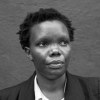



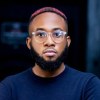

Related Content
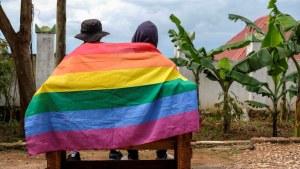 US Foreign Policy
US Foreign Policy
American religious groups have spent millions exporting homophobia to the East African nation.
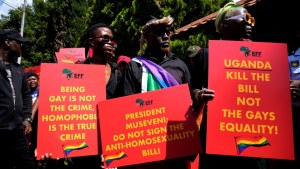 Inclusion and Equity
Inclusion and Equity
“As we celebrate the LGBTQ community here at home, let’s not forget the fight to protect them elsewhere continues,” writes Elizabeth Shackelford.
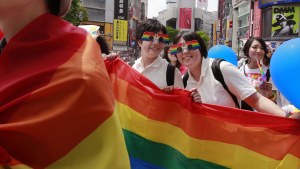 Inclusion and Equity
Inclusion and Equity
Polling shows the Japanese public supports recognizing same-sex marriages, even as officials stall on legislation to advance equality.
